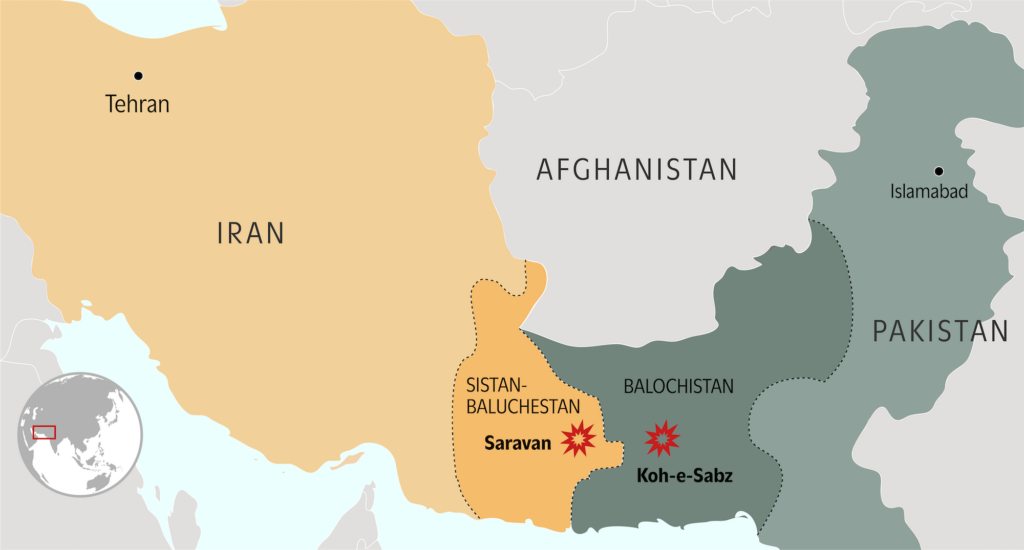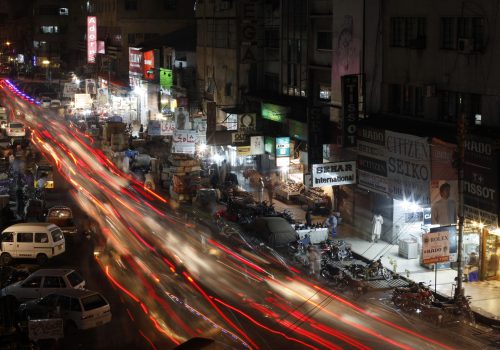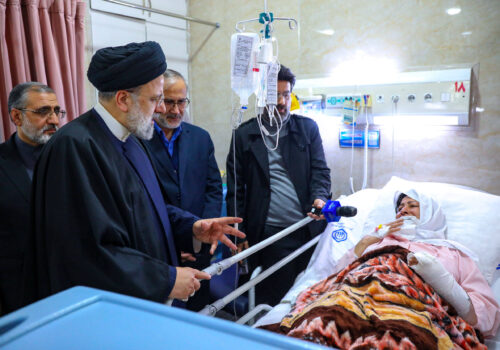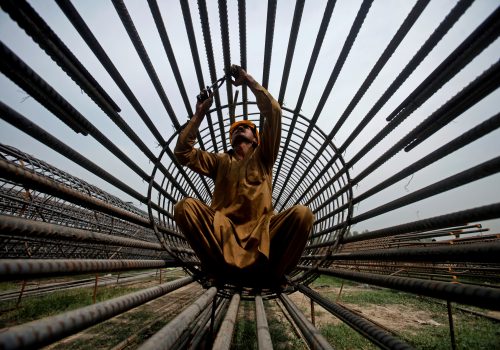Experts react: What’s really going on with Pakistan and Iran exchanging attacks?
On Tuesday, Iran used missiles and drones to strike western Pakistan near Koh-e-Sabz. On Thursday, Pakistan conducted airstrikes in southeastern Iran near Saravan, then released a statement claiming that “Iran is a brotherly country.”
More than a sibling squabble is going on here. Iran and Pakistan were apparently targeting hideouts of armed non-state actors—Jaish al-Adl in Pakistan, and the Balochistan Liberation Army and the Balochistan Liberation Front in Iran—that each country accuses the other of harboring. Will the tit-for-tat strikes escalate? How does this flashpoint fit in with ongoing conflicts involving Iranian proxies in Yemen and Gaza? Below, experts from our Atlantic Council family share their insights.
Click to jump to an expert analysis:
Anne Patterson: The international community has limited options to reduce Iran-Pakistan tensions
Mark N. Katz: Iran and Pakistan strikes are unlikely to lead to escalation
Shuja Nawaz: Iran resurrects past grievances with Pakistan—and vice versa
Jason M. Brodsky: Iran’s strike reveals its concern that its deterrence has eroded
Nadereh Chamlou: With its legitimacy in question, the regime was sending a message to Iranians
Thomas S. Warrick: Pakistan demonstrates its understanding of Iran’s peculiar sense of symmetry
Rabia Akhtar: Iran-Pakistan missile showdown puts diplomacy to the test
Carmiel Arbit: Pakistan-Iran strikes will further frustrate US efforts to reduce regional tensions
Kelly J. Shannon: The tit-for-tat strikes risk further destabilizing the Middle East

The international community has limited options to reduce Iran-Pakistan tensions
The reciprocal attacks between Pakistan and Iran were a marked escalation to decades of skirmishes along one of the world’s more remote border regions. The international response may well be confused, since no one knows much about the area or about the terrorist groups or even the internal decision-making process of the countries involved. The Baloch separatists have always been opaque to outsiders, and much more so organizations like Jundullah and its offshoot Jaish al-Adl. In the past, most observers would have been reasonably confident that the situation would not escalate given that both sides have now thrown a punch. Iran and Pakistan have a long history of workmanlike relations, and conflict is not in their interest. The Pakistani military is led by practical (if newly appointed) generals who know their limits but could not stand by domestically while Pakistani territory was attacked. But no one knows how the Iranians will react given other pressures in the region or whether one of the ragtag terrorist groups could provoke another confrontation.
The international community has limited options to reduce tensions, although the United States is no doubt urging restraint. Unfortunately, US influence with Islamabad has waned because of the US decision to keep Pakistan, and particularly the Pakistani army, at arm’s length. Pakistan’s chief of army staff received that message loud and clear in his recent visit to Washington. There has been little concern in Washington, and maybe even a little smugness, about the proliferation of cross-border attacks from Afghanistan and the state of Pakistan’s economy. It would not take much effort on the part of the United States to use this incident to begin to rebuild trust with Pakistan instead of ceding leadership to China. The overworked Qataris, who have good relations with both countries, could play a role, as could others, such as Kuwait and maybe even Saudi Arabia.
—Anne Patterson is a former US assistant secretary of state for Near Eastern affairs. She served as US ambassador to Pakistan from 2007 to 2010.
Iran and Pakistan strikes are unlikely to lead to escalation
There has been a tendency in the media to view the recent Iranian attack on Pakistani territory and Pakistani attack on Iranian territory as somehow related to the Israel-Hamas conflict, but it is not. Nor does it necessarily portend a larger Iranian-Pakistani conflict. Neither Iran nor Pakistan launched an attack against the other’s forces or assets. Instead, each attacked against what they consider to be jihadi forces inside the other’s territory that the other also considers problematic. While Pakistan had long supported the Taliban against the US-backed Kabul government before its downfall, jihadists have become an increasing threat to the Pakistani government. And the Baloch forces whom Pakistan targeted inside Iran are causing problems for Iran as well. A cynic might even claim that Tehran and Islamabad have done each other something of a favor.
In my view, Pakistani and Iranian forces are not likely to get into a shooting match with each other. If they do, though, the United States will be less able to serve as a mediator due to its lack of relations with Iran than would other powers—such as China, Russia, and possibly the European Union—that can work with both countries.
—Mark N. Katz is a nonresident senior fellow with the Atlantic Council’s Middle East Programs.
Iran resurrects past grievances with Pakistan—and vice versa
The delicate and fraught Iran-Pakistan relationship approached a breaking point this week with an Iranian attack inside Pakistan’s Balochistan province on Jaish al-Adl, the successor of the long-standing Jundullah, which is designated as a Foreign Terrorist Organization by the United States.
Pakistan’s expected and rapid response early on January 18 via an aerial attack on Baloch nationalists using Iran as a base raised the ante but it is unclear if both countries have the desire or the ability to escalate to direct conflict with each other’s forces. It is not clear if Pakistan’s caretaker Prime Minister Anwaar-ul-Haq Kakar, who attended the World Economic Forum in Davos this week, took that decision or whether the military took it for him, since he had a public meeting with the Iranian foreign minister in Davos. Kakar reportedly called a meeting of his National Security Council on his return to Pakistan.
As far back as 2007, reports by ABC News and others hinted at US covert assistance to Jundullah against Iran. Meanwhile, Pakistan is alleged to have played a role in the capture of its leader Abdolmalek Rigi by Iran in 2010. If Iran believes that the United States has been covertly aiding Jaish al-Adl, that could explain Tehran’s decision to attack inside Pakistani territory. Pakistan risks being drawn into this conflict. A big question is why it allowed Jaish al-Adl to operate inside its province of Balochistan. Was it a continuation of past favors for the United States? If so, Pakistan may pay a price in its deteriorating relationship with Iran, which risks harming the two countries’ trade relations, which surpass two billion dollars per year. Energy reportedly makes up a significant part of this trade, especially in the form of diesel fuel and electricity in border areas of Pakistan. An equally important question is why Iran has allowed Baloch nationalists to use its territory as sanctuary and Indian agents to operate out of Iranian Balochistan for operations against Pakistan.
A weak caretaker government in Pakistan cobbled together to hold elections on February 8 may not be best equipped to deal with these complicated issues, allowing the military to take center stage yet again.
—Shuja Nawaz is a distinguished fellow and founding director of the South Asia Center of the Atlantic Council and author of The Battle for Pakistan: The Bitter US Friendship and a Tough Neighborhood.
Shooting missiles at Syria, Iraq, or Pakistan won’t resolve Iran’s security problems
Over the past few days, Iran has launched an unprecedented barrage of missiles at training camps of Islamist elements near Idlib in Syria, at a site it claims is “used by the Mossad” in the Kurdish region of Iraq, and against training bases of the terrorist organization Jaish al-Adl in Pakistan. The purpose of this intense shooting was to take revenge: on the Islamic State of Iraq and al-Sham (ISIS), which carried out the attack in Kerman on the anniversary of the assassination of Qassem Soleimani; and on Israel for the apparent assassinations of Sayyed Razi Mousavi in Syria and Saleh al-Arouri in Lebanon. And it now appears to have taken revenge on Jaish al-Adl for the chain of attacks against Iranian officers and soldiers on the Iran-Pakistan border.
Iran has launched missiles against similar targets in these countries after previous attacks (in response to the ISIS attack on the Iranian parliament in 2022, for example). The uniqueness of these attacks mainly concerns the short period that passed between attacks (some even occurred at the same time), the combination of different weapon systems, and especially the distance of the targets from Iran.
Allegedly, this shooting also allowed Iran to demonstrate its strength not only in the face of external threats but also in front of the domestic arena. However, it is highly doubtful whether these missile attacks will be a solution to the fundamental security problems that Iran suffers from, as evidenced by the fact that even after these attacks, Iranian security personnel were killed on the Pakistani border.
It seems that as far as Iran is concerned, the missile attack is a one-trick pony; that is, a lack of diverse tools to deal with its security problems forces it to return again and again to missile fire. Beyond that, this shooting not only causes political tension between Iran, Pakistan, and Iraq but also constitutes another indication of the similarity between Iran’s activities and that of its proxies.
—Danny Citrinowicz is a nonresident fellow with the Atlantic Council’s Middle East Programs and a member of the Atlantic Council’s Iran Strategy Project working group. He previously served for twenty-five years in a variety of command positions units in Israel Defense Intelligence.
Iran’s strike reveals its concern that its deterrence has eroded
Tensions between Iran and Pakistan have been long-standing. Assaults like Jaish al-Adl’s attack in December 2023 on an Iranian police station in Rask are nothing new. A year earlier, militants killed four members of the Islamic Revolutionary Guard Corps in Saravan and then fled back to Pakistan. But Iran’s differing responses to these two events is new. Back in December 2022, Iran’s armed forces did not launch strikes in Pakistan in response. Fast forward to January 2024, they did.
This change reflects mounting concern inside the Islamic Republic that its deterrence has eroded over years of failed or non-responses to a variety of assaults against its interests—sponsored by Israel, the United States, ISIS, and local militant groups. Coupled with an increasingly pressurized regional landscape in the aftermath of the October 7 massacre in Israel, this need to respond is likely what triggered Iran to do something out of character in the attack on purported Jaish al-Adl targets in Pakistan. The Iranian government likely calculated that the costs of not responding were too great in this regional context, felt that whatever Pakistan did in response would be absorbable, and figured that it could showcase strength while avoiding US reprisals.
Pakistan, in turn, launched its own strikes against Baloch Liberation Army and Baloch Liberation Front assets inside Iran. However, Islamabad’s choice of targets—which avoided the Iranian military—was a calculated, proportional response to Iranian strikes on Jaish al-Adl, which also avoided the Pakistani military. This signals a lack of interest in escalating, while sending a deterrent message.
In the end, Tehran will be nervous, as it knows the United States will be watching how Pakistan swiftly responded kinetically on Iranian territory.
—Jason M. Brodsky is the policy director of United Against Nuclear Iran and is a member of the Atlantic Council’s Iran Strategy Project working group.
With its legitimacy in question, the regime was sending a message to Iranians
The exchange of fire across the Balochistan regions of the two Islamic republics of Iran and Pakistan is not a first, despite their long-standing relations. But it is a first very public one, which both sides knew could not go unanswered, regardless of the fact that they alerted each other in advance of the intent to target their own “terrorist” citizens who may have sought refuge on the other side. Sadly, it appears innocent women and children made up most of the deaths.
So, what else could explain the rash attacks by the Islamic Revolutionary Guard Corps (IRGC) eastward in Pakistan and in Iraqi Kurdistan a day earlier? Why would Iran expose its air-defense vulnerability by risking a missile attack from Pakistan when US forces are positioned as potential threats across the Persian Gulf and the Gulf of Oman to deter a widening of the Israel-Hamas conflict? And didn’t the IRGC promise just days ago to avenge the more than ninety deaths in the January 3 explosion in Kernan at the commemoration of the anniversary of the death of its much-revered Qasem Soleimani, which curiously Soleimani’s children and high officials reportedly skipped? Why did it prioritize bombing regions that border Iran’s Sunni-dominated Kurdistan and Balochistan, even though Tajik members of the Islamic State Khorasan Province seemed to have claimed responsibility for the explosion, and not any group related to Kurds or Baluchis or Israel or the United States?
In light of the Biden administration’s insistence of not wishing a wider regional conflict, or direct confrontation with Iran, could the attacks not only be a signal of Iran’s readiness to strike outside its borders should that be necessary, but also be a message to Kurdish and Baluchi Iranians that the regime was now prepared for more brutality toward them, should they be more insistent? After all, these two groups put up the most valiant and united fronts in the “Women, Life, Freedom” movement since September 2022, which has shaken the regime by all measures. It has since eroded further its very narrow base within Iranian society. With the upcoming parliamentary election in Iran next month, and the regime’s justified fear of an extremely low turnout—perhaps as low as 15 percent—its legitimacy is in question. At least the IRGC, whose mission is the survival of the regime rather than the safety and security of Iran and Iranians, can send the message that with or without Iranians’ support, the Islamic Republic will stop at nothing to use force. Its main adversary is the Iranian people and not outside powers. Hence, it is highly likely that grievances with Pakistan and Kurdish Iraq will be patched up and not lead to a wider conflict.
—Nadereh Chamlou is a nonresident senior fellow at the Atlantic Council’s empowerME initiative and a member of the Atlantic Council’s Iran Strategy Project working group. Previously, she was a senior advisor at the World Bank.
Pakistan demonstrates its understanding of Iran’s peculiar sense of symmetry
Pakistan’s retaliatory strike on Iran demonstrated its understanding of Iran’s peculiar sense of symmetry. Iran struck Tuesday in Pakistan against what it said were ethnic Baloch separatists from Jaish al-Adl or Jaish al-Dhulm (“Army of Justice”) days after a suicide bombing killed ninety-one people in Kerman, Iran, for which ISIS claimed responsibility. Pakistan’s strike in Iran was roughly on the same scale and against Baloch separatists it accused of sowing divisions in Pakistan. Both sides then asserted their desire not to escalate further, raising hopes this will be the end of this round of attacks.
The difference between this and the Iranian regime-supported Houthi attacks in Yemen is that here, the Islamic Republic wants to lower the temperature of conflict with Pakistan, whereas in Yemen, Iraq, Lebanon, and Syria, Iran wants to raise the temperature in an effort, among other goals, to drive the United States out of the Middle East and establish Iran’s regional dominance. It will take a regional strategy, not just a one-off strike, to persuade Iran to drop its regional campaign.
—Thomas S. Warrick is the director of the Future of DHS project at the Scowcroft Center for Strategy and Security’s Forward Defense practice, a nonresident senior fellow and the Scowcroft Middle East Security Initiative at the Atlantic Council, and a member of the Atlantic Council’s Iran Strategy Project working group. He previously served as deputy assistant secretary for counterterrorism policy in the US Department of Homeland Security.
Iran-Pakistan missile showdown puts diplomacy to the test
The recent missile strike by Pakistan against the Iranian targets in retaliation for Iran’s air raids in Balochistan has brought the long-standing tensions between the two countries to the forefront.
It is vital to understand the motive behind Iran’s strikes in Pakistan and their potential implications. Tehran’s miscalculated actions should not only be seen as a retaliation against Jaish al-Adl aimed at provoking a response from Pakistan. Instead, they should be seen as intended to demonstrate Iranian military capability and send a message to the United States, Israel, and Arab US allies indicating Iranian military prowess and readiness to confront any external aggression. The Iranian ballistic missile strikes in Iraq, Syria, and Pakistan also highlight Iran’s ability to project power beyond its borders and could have significant implications for regional security. The Pakistani response to the Iranian strikes has been influenced by a variety of factors, including internal political dynamics, the nature of the strikes, and the perception that its deterrent capabilities had broken down. However, Pakistan’s unflinching resolve to protect and defend its national security against all threats is clearly demonstrated by its response.
There is a larger picture emerging in the Middle East of deep Iranian involvement on all fronts. Iran’s support for the Houthis is a source of concern for many, as it presents a challenge to regional stability and the security of key shipping lanes. Furthermore, Tehran’s backing of proxy groups like Hamas and non-state actors throughout the Middle East has contributed to a broader sense of insecurity in the region. Despite its unfortunate attempts to project strength, Iran’s actions have raised concerns among its neighbors and the international community with Pakistan now having to recalculate its already fragile relations with Iran. As tensions continue to rise, it is crucial for all parties to engage in dialogue and pursue diplomatic solutions to prevent further escalation and ensure regional stability.
—Rabia Akhtar is a nonresident senior fellow at the Atlantic Council’s South Asia Center. She is also the director of the Centre for Security, Strategy, and Policy Research at the University of Lahore.
Pakistan-Iran strikes will further frustrate US efforts to reduce regional tensions
As the war between Israel and Hamas rages on, the United States has struggled to contain the conflict. Iran has been emboldened by October 7: Its proxies have attacked Israel on its northern border, hijacked shipping lines in the Red Sea, and clashed directly with US forces. Against this background, Iran has brazenly ramped up uranium production as it accelerates its nuclear weapons ambitions—and is only further escalated through missile strikes in Syria, Iraq, and Pakistan. Yet for all of Iran’s provocations, the United States and Israel have never responded to Iran by attacking inside Iranian territory. Pakistan has now crossed that line, and Iran, desperate to flex its military muscle in the region, may be cajoled deeper into conflict with its neighbor—in addition to its so-called “Zionist enemies.”
The spat reveals the fragility of the situation in the region—and will only further frustrate the Biden administration’s attempts through aggressive and sustained diplomacy to reduce the temperature. But they must not relent in these diplomatic efforts—a widened regional war is not in the interest of any party.
—Carmiel Arbit is a nonresident senior fellow for Middle East Programs and the Scowcroft Middle East Security Initiative at the Atlantic Council.
The tit-for-tat strikes risk further destabilizing the Middle East
The recent Iran-Pakistan military strikes risk further destabilizing an already unstable Middle East. The Islamic Republic of Iran has had a historically tense relationship with Pakistan. But this week’s strikes are unprecedented. While Iran has become bolder in its international behavior—supporting militant groups across the Middle East, flouting international sanctions, allying with Russia in the war in Ukraine, etc.—the theocracy is increasingly weak at home. The Woman, Life, Freedom protest movement that began in fall 2022 rocked Iran to its core. These protesters call not for reform, like earlier protest movements, but the end of the Islamic Republic and the establishment of a democracy. While mass demonstrations have subsided, anti-regime dissidents continue to organize and resist. The unprecedented anti-regime sentiment among a large swath of the Iranian public will persist and grow. Meanwhile, suicide bombings in Iran in early January by ISIS that killed and injured scores of Iranians revealed the regime’s weakness in protecting its own territory.
This week’s strikes appear to be Iran’s attempt to project strength at home and to its allies and proxies, as well as to issue a warning to its enemies that it will use force to defend its interests. The strikes may also be a distraction from the situation in Gaza and attacks by its client, the Houthi rebels of Yemen, on shipping in the region. Pakistan, which faces its own internal pressures, had to respond to what it sees as an unprovoked Iranian attack. This situation has at least two possible outcomes. The first is that the Iran-Pakistan exchange has satisfied each government’s need to appear strong, and the situation will return to the status quo ante. The second is that there will be continued tit-for-tat military exchanges between Iran and Pakistan that could escalate and add to the already considerable risk of a wider Middle East war. Iran’s increasing assertiveness, or perhaps recklessness, remains a serious threat to regional and global peace.
—Kelly J. Shannon is a 2023-2024 W. Glenn Campbell and Rita Ricardo-Campbell National Fellow at the Hoover Institution at Stanford University and an associate professor of history at Florida Atlantic University. She is also a member of the Atlantic Council’s Iran Strategy Project working group.
Further reading
Fri, Nov 3, 2023
Pakistan’s long journey toward sustainable growth requires timely, free, and fair elections
New Atlanticist By Uzair Younus
Elections should be followed by a transparent, consensus-driven process that devolves power to the grassroots level through functional local governments.
Mon, Jan 8, 2024
ISIS was behind the Kerman attack. Iran still blames Israel and the United States, though.
IranSource By
Despite Iran’s bombastic rhetoric, however, its response against ISIS assets will likely be limited.
Mon, Aug 28, 2023
Pakistan has a capital problem. Infrastructure investment can be a solution.
New Atlanticist By Ammar Habib Khan
Islamabad must utilize unconventional tools to mobilize local private capital and reallocate it toward infrastructure development.
Image: A man watches a news channel on television inside a shop after the Pakistani foreign ministry said the country conducted strikes inside Iran targeting separatist militants, two days after Tehran said it attacked Israel-linked militant bases inside Pakistani territory, in Peshawar, Pakistan January 18, 2024. REUTERS/Fayaz Aziz


